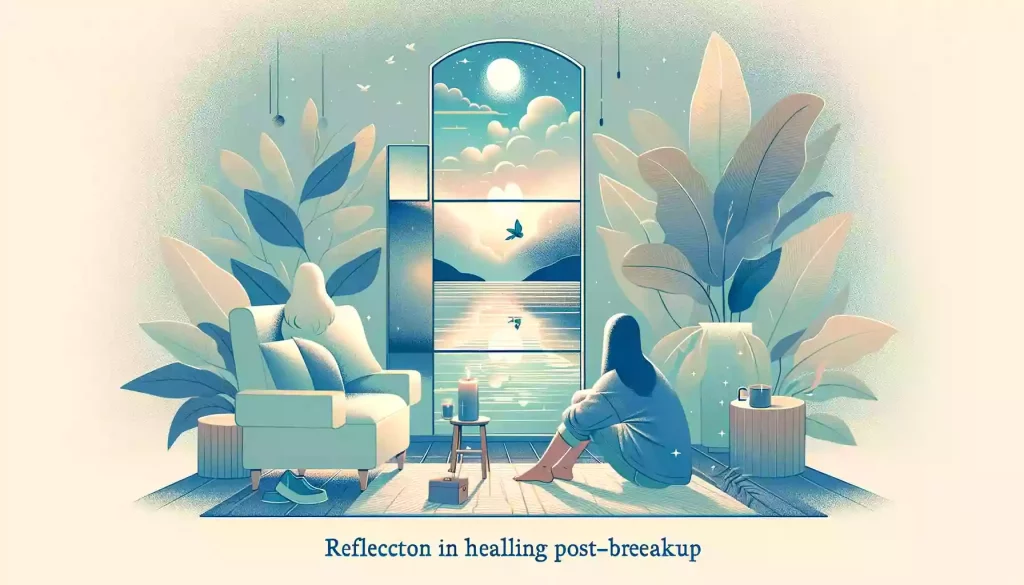Key Takeaways:
- Recognizing and navigating the various stages of a breakup is crucial for emotional healing.
- Journaling can be a therapeutic tool for expressing feelings and gaining clarity after a breakup.
- Creating a personalized recovery plan aids in finding a path to emotional well-being.
- Implementing self-care practices and setting boundaries are essential steps towards recovery.
- Embracing change leads to growth and new opportunities post-breakup.
Understanding the Stages of a Breakup
Breakups are not just singular events but a journey through various emotional stages. Understanding these stages can be a crucial step in your healing process. The first stage often involves shock and denial, where accepting the end of the relationship might feel impossible. It's a natural defense mechanism to buffer the initial pain.
Following this, you might experience intense emotions like anger, bargaining, and depression. Anger can manifest as frustration towards yourself or your ex-partner, while bargaining might involve replaying 'what if' scenarios in your mind. It's important to acknowledge these feelings without judgment.
Depression in a breakup context doesn't necessarily mean clinical depression, but it's common to feel profound sadness, loneliness, and a sense of loss. During this stage, it's vital to seek support from loved ones or professionals.
Gradually, you'll enter the stage of acceptance. This doesn't mean you're 'over it,' but rather you're beginning to accept the reality of the situation. It's a sign of emotional growth and resilience.
The final stage involves rebuilding and moving forward. Here, you rediscover your individual identity outside of the relationship, explore new interests, and consider future possibilities in love and life.
Remember, these stages aren't linear. It's normal to cycle back and forth between them, and everyone's journey is unique. Patience and self-compassion are key during this time.
Finally, it's essential to recognize when you might need extra help. If you find yourself struggling to move through these stages, don't hesitate to reach out to a therapist or counselor who specializes in relationship issues.
Journaling Your Way Through Heartbreak
Journaling can be a powerful tool for healing during a breakup. It provides a private space to express your thoughts and feelings, helping you process the complex emotions you're experiencing. Start by writing about your feelings as they arise, without any filter or concern for grammar. This raw expression can be incredibly cathartic.
As you continue journaling, try to explore the deeper aspects of your relationship and breakup. Reflect on what you've learned from the experience and how it has shaped you. This can lead to valuable insights and a greater understanding of yourself and your needs in a relationship.
Don't hesitate to include positive memories and gratitude in your journal. Remembering the good times isn't about dwelling on the past but acknowledging and appreciating the role the relationship played in your life.
Lastly, use your journal to set goals and envision a future beyond the breakup. Writing down your hopes and aspirations can be a motivating force, steering you towards recovery and new beginnings.
Navigating Emotional Turmoil Post-Breakup

After a breakup, you may find yourself engulfed in a whirlwind of emotions. It's a period marked by ups and downs, confusion, and often, overwhelming sadness. The first step in navigating this emotional turmoil is acknowledging your feelings. Accept that it's okay to feel hurt, angry, or lost.
Seeking support is crucial during this time. Lean on friends and family, but also consider joining support groups or talking to a therapist. These resources provide not only comfort but also different perspectives and coping strategies.
Engaging in activities that promote mental and emotional well-being is another key aspect. Whether it's exercise, meditation, or a hobby, find something that brings you joy and helps to distract from the pain.
Reflection is an important part of the healing process. Take time to think about the relationship and breakup objectively. What lessons can you learn? How can this experience contribute to your personal growth?
Finally, give yourself permission to move forward. It's not about forgetting the past, but rather about making peace with it and opening up to new experiences and opportunities. Remember, healing is not linear, and it's okay to have setbacks along the way.
Rediscovering Yourself After a Relationship Ends
A breakup can lead to a profound period of self-discovery. Initially, you might feel lost, as if a part of your identity is missing. However, this also opens a door to rediscover who you are outside of a relationship.
Start by revisiting your interests and passions that might have been sidelined. Whether it's an old hobby or a new skill you've always wanted to learn, now is the time to explore these interests.
Reconnect with friends and family. Relationships often take a backseat during a romantic partnership, so use this time to strengthen these bonds. Social support is invaluable for emotional recovery.
Consider setting new goals for yourself. These could be career-oriented, personal development goals, or even travel plans. Goals give you something to look forward to and work towards.
Self-reflection is another crucial aspect. Reflect on your past relationship – what worked, what didn't, and what you can learn from it. This reflection can provide insights that help in future relationships.
Don't rush into another relationship. Use this time to be comfortable with being alone. It's an opportunity to grow and understand what you truly want and need in a partner.
Lastly, embrace change. Change can be scary, but it's also a chance for growth and new experiences. Be open to the possibilities that lie ahead of you.
The Role of Reflection in Healing

Reflection is a critical component of healing from a breakup. It involves looking inward, examining your emotions, thoughts, and the relationship itself. This process can lead to valuable insights and a deeper understanding of yourself.
Start by setting aside quiet time each day for reflection. This could be through meditation, sitting quietly in a natural setting, or simply being alone with your thoughts. The key is to create a space where you can think without distractions.
Reflect on the positives and negatives of the relationship. What did you learn? What would you do differently? Acknowledge both the joy and the pain the relationship brought, as each has its own lessons.
Writing can be a helpful tool for reflection. Whether it's in a journal or just notes on your phone, writing down your thoughts can help you process and understand them better. Sometimes, seeing things in writing provides a new perspective.
Finally, remember that reflection is not about dwelling on the past or blaming yourself. It's about gaining clarity, learning from your experiences, and using these lessons to grow and move forward.
Creating a Personalized Breakup Recovery Plan
A personalized breakup recovery plan is a roadmap to navigating your healing journey. It's a structured approach to dealing with the aftermath of a breakup, tailored to your specific needs and situation.
First, identify your primary emotions and challenges. Are you struggling with loneliness, anger, or perhaps a loss of identity? Recognizing these feelings is the first step in addressing them.
Set realistic goals for your recovery. These could be emotional goals, like achieving a sense of closure, or practical goals, like rebuilding your social life. Ensure these goals are achievable and measurable.
Incorporate self-care into your plan. This includes physical care, like exercise and sleep, as well as emotional care, such as spending time on hobbies or with loved ones. Self-care is vital for emotional resilience.
Consider professional help if needed. A therapist or counselor specializing in relationship issues can provide valuable guidance and support.
Stay flexible with your plan. Healing is not a linear process, and you may need to adjust your strategies as you go along. What works one week may not work the next, and that's okay.
Keep track of your progress. Regularly reflect on how far you've come and celebrate small victories. This can be incredibly motivating and affirming.
Lastly, be patient with yourself. Healing takes time, and it's important to allow yourself to move through the process at your own pace. Remember, this is a journey towards a stronger, more resilient you.
Finding Support: Friends, Family, and Professionals

During the challenging time of a breakup, the support of friends, family, and professionals can be invaluable. Friends and family provide a familiar, comforting presence. They know you well and can offer emotional support, practical help, or just a listening ear when you need to vent or talk things through.
Don't hesitate to lean on your social circle. Sometimes, just spending time with people who care about you can be incredibly uplifting. Plan activities, have regular meetups, or even just regular phone calls to stay connected.
Professional support, such as therapy or counseling, offers a different kind of help. A therapist can provide unbiased guidance and help you work through your emotions in a structured way. They can also teach coping mechanisms and strategies for dealing with the aftermath of a breakup.
Support groups, either in-person or online, can also be beneficial. Connecting with others who are going through similar experiences can make you feel less alone and provide a sense of community and understanding.
Coping Strategies for Difficult Days
Everyone has difficult days, especially after a breakup. Developing coping strategies can help you navigate these moments. Start by acknowledging your feelings. It's okay to feel sad, angry, or frustrated. Allow yourself to experience these emotions without judgment.
Engaging in physical activity can be a great way to manage stress and improve mood. Whether it's a brisk walk, a yoga session, or a trip to the gym, find an activity that you enjoy and that gets you moving.
Mindfulness and meditation can also be helpful. These practices teach you to stay present and can reduce feelings of anxiety and depression. Even just a few minutes a day can make a difference.
Don't underestimate the power of a routine. Having a structure to your day can provide a sense of normalcy and control. Try to maintain regular sleep patterns, meal times, and even a work or activity schedule.
Creative expression, such as writing, painting, or playing music, can be therapeutic. These activities provide an outlet for your emotions and can be very fulfilling.
Remember to practice self-compassion. Be kind to yourself, just as you would be to a friend going through a tough time. Give yourself permission to take things slow and to not have everything figured out right away.
Finally, focus on small, achievable goals. These could be as simple as reading a book, completing a small project, or planning a day trip. Accomplishing these goals can provide a sense of achievement and help boost your mood.
Embracing Change and New Beginnings
Embracing change after a breakup is both challenging and rewarding. It involves stepping out of your comfort zone and facing the unknown. Start by acknowledging that change is a natural and necessary part of life. It opens the door to new experiences and opportunities for growth.
Reflect on what you've learned from your past relationship. These lessons can guide you in making positive changes and decisions in your life. Use this knowledge to shape a future that aligns with your values and aspirations.
Trying new activities can be a great way to embrace change. Whether it's a new hobby, joining a club, or volunteering, these activities can broaden your horizons and introduce you to new people and experiences.
Change your routine. Even small changes, like a new route to work or a different coffee shop, can refresh your perspective and open you up to new possibilities.
Focus on your personal goals. What are your ambitions, both professionally and personally? Pursuing these goals can provide a sense of purpose and direction in this new chapter of your life.
Lastly, be patient with yourself. Embracing change doesn't happen overnight. Allow yourself time to adjust and find comfort in the new beginnings that are unfolding in your life.
Setting Healthy Boundaries for Future Relationships
Setting healthy boundaries is crucial for any future relationships. It involves knowing and understanding your limits and communicating them to others. Start by reflecting on your past relationship. What boundaries were crossed? What do you wish had been different?
Learn to communicate your needs and boundaries clearly. This might be uncomfortable at first, especially if you're not used to it, but it's essential for a healthy relationship. Remember, it's okay to say no or to ask for what you need.
Understand that boundaries aren't just about saying no; they're also about creating a healthy space for yourself. This includes setting aside time for your own interests, hobbies, and friendships outside of a romantic relationship.
Respect the boundaries of others as well. Healthy relationships are built on mutual respect and understanding. Acknowledge and honor the limits and needs of your partner.
Finally, remember that boundaries can evolve. As you grow and change, your needs and limits might also change. Regularly check in with yourself and be open to adjusting your boundaries as necessary.
The Importance of Self-Care During Recovery
Self-care is a vital part of the recovery process from a breakup. It's about taking the time to look after your physical, emotional, and mental well-being. Start with the basics: ensure you're getting enough sleep, eating well, and engaging in physical activity. These foundational aspects of self-care can significantly impact your overall mood and energy levels.
Emotional self-care is equally important. This might include activities like journaling, meditation, or simply allowing yourself time to relax and do things you enjoy. Don't underestimate the power of laughter and fun in the healing process.
Seeking professional help can be a form of self-care. Whether it's therapy, counseling, or joining a support group, these resources provide support and guidance tailored to your needs.
Set aside time for reflection and self-discovery. This can involve exploring your interests, values, and what brings you joy and fulfillment outside of a relationship.
Remember to be patient and kind to yourself. Healing takes time, and it's okay not to have everything figured out. Treat yourself with the same compassion and understanding that you would offer a friend in a similar situation.
Finally, develop a self-care routine that works for you. What works for one person might not work for another. Find activities and practices that resonate with you and incorporate them into your daily or weekly routine.
Moving On: Steps to Embrace Life Post-Breakup
Moving on after a breakup is a journey of rediscovery and growth. The first step is to accept the end of the relationship. This acceptance is crucial for closing one chapter and opening another.
Reflect on the lessons learned from the relationship. What insights have you gained about yourself, your needs, and what you want in a partner? Use these lessons to inform your decisions and actions moving forward.
Reconnect with your passions and interests. Often in relationships, personal interests can take a backseat. Now is the time to rediscover and pursue these activities.
Expand your social circle. Meet new people, whether through social events, hobbies, or even travel. New connections can bring fresh perspectives and experiences into your life.
Finally, embrace the future with optimism. A breakup, though painful, is also an opportunity for new beginnings and experiences. Keep an open mind and heart to the possibilities that lie ahead.
FAQ: Common Questions About Handling Breakups
1. How long does it take to get over a breakup?
The time it takes to get over a breakup varies greatly from person to person. Factors like the length and intensity of the relationship, personal resilience, and the presence of a supportive network all play a role. It's important to remember that healing is a process and can't be rushed.
2. Is it normal to still love my ex?
Yes, it's perfectly normal to still have feelings for your ex after a breakup. Love doesn't necessarily stop the moment a relationship ends. Give yourself time to process these feelings and gradually let go.
3. How can I deal with the urge to contact my ex?
Dealing with the urge to contact your ex can be challenging. Try redirecting your focus to other activities, talking to friends or family, or writing down your feelings in a journal instead of reaching out to your ex. Setting clear boundaries for yourself can also help.
4. Should I stay friends with my ex?
Deciding to stay friends with an ex depends on the individual circumstances of your breakup and how both parties feel. It's important to ensure that enough time has passed for emotional wounds to heal and that the friendship doesn't hinder your recovery.
5. How do I handle mutual friends after a breakup?
Navigating mutual friendships post-breakup can be tricky. Communicate your feelings with your friends and set boundaries if needed. It's okay to take a step back from social situations that include your ex until you feel more comfortable.
Recommended Resources
- The Breakup Recovery Workbook: Daily Writing Prompts to Help You Get Through Your Breakup, Heartbreak, and Divorce by Sarah Brokaw, Independently Published, 2019
- Getting Past Your Breakup: How to Turn a Devastating Loss into the Best Thing That Ever Happened to You by Susan J. Elliott, Da Capo Lifelong Books, 2009
- I Can Mend Your Broken Heart by Paul McKenna and Hugh Willbourn, Bantam, 2009
- The Wisdom of a Broken Heart: An Uncommon Guide to Healing, Insight, and Love by Susan Piver, Simon & Schuster, 2010
- It's Called a Breakup Because It's Broken: The Smart Girl's Break-Up Buddy by Greg Behrendt and Amiira Ruotola-Behrendt, Broadway Books, 2005






Recommended Comments
There are no comments to display.
Create an account or sign in to comment
You need to be a member in order to leave a comment
Create an account
Sign up for a new account in our community. It's easy!
Register a new accountSign in
Already have an account? Sign in here.
Sign In Now